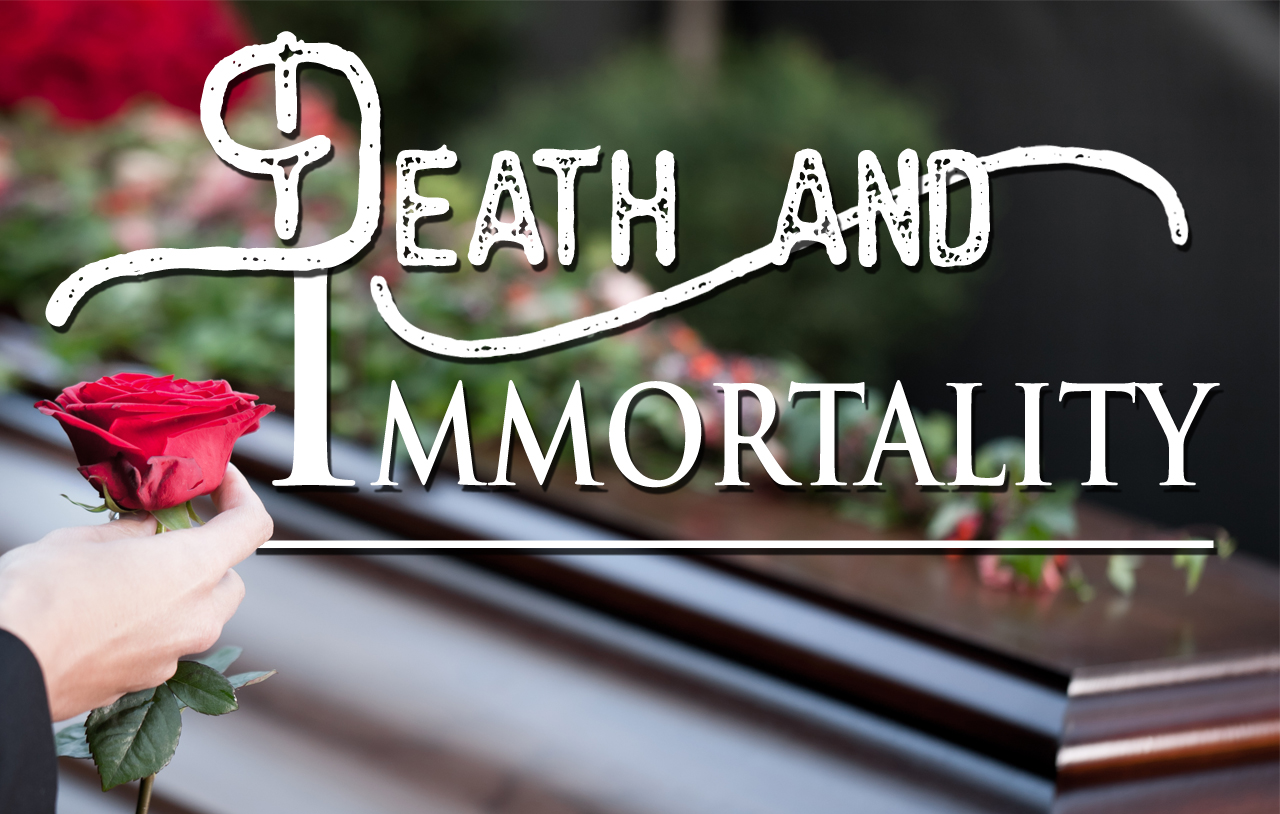
|
This is a non-WLC article. When using resources from outside authors, we only publish the content that is 100% in harmony with the Bible and WLC current biblical beliefs. So such articles can be treated as if coming directly from WLC. We have been greatly blessed by the ministry of many servants of Yahuwah. But we do not advise our members to explore other works by these authors. Such works, we have excluded from publications because they contain errors. Sadly, we have yet to find a ministry that is error-free. If you are shocked by some non-WLC published content [articles/episodes], keep in mind Proverbs 4:18. Our understanding of His truth is evolving, as more light is shed on our pathway. We cherish truth more than life, and seek it wherever it may be found. |
The church had always taught me that Christians go to heaven at death and non-Christians go to hell. I had no reason to question this until the latest article from a blog I was following arrived in my mailbox. I scanned the first few lines. My finger hovered over the delete button as it often does, especially when heresy is concerned. I had heard about these types before. They could not deal with what the Bible said about eternal torment and wanted to make Yahuwah soft on sin. However, the word in the email caught my attention: “reformers.” Some reformers did not believe in the traditional view of life after death, and as I had some respect for the reformers, my finger did not land on the button. I read the article further and understood that two different but related views were proposed. First, we die entirely until the resurrection. Secondly, hell was not eternal torment. I was open-minded to the first view but not so much to the second. However, the mention of reformers intrigued me.

It was with some hesitancy that I started researching this subject. It felt wrong to question the church’s teaching; honestly, it felt very heretical. I remembered the famous Anglican theologian John Stott who had announced towards the end of his life that he no longer believed in eternal torment. This caused an uproar in some church circles at the time. I discussed this with a friend soon afterward. We both wondered how a gifted theologian could have allowed himself to be so deceived after such a distinguished career. Of course, we both knew better or so we thought. Yet the truth was that I had never even looked into the issue from a biblical perspective and only relied on teaching from the pulpit.
As I read about this topic in the Bible, it was clear that we return to the dust of the ground at death. It is a consistent message throughout the Old Testament, and the Hebrew mindset never contemplated anything different. This picture of death is continued in the New Testament. Death is described several times as sleeping in Christ until the resurrection, when believers are given immortality, which does not belong to us by nature. Only Greek influence has successfully superimposed a secondary interpretation of the ideas of immortality and eternal torment onto a minority of passages from the New Testament. I plan to deal with some of these constructively in this article.
Asleep in Christ
The topic of what happens at death is strange in the church. Funeral services highlight this dilemma particularly well when, in an attempt to comfort the relatives, ministers often talk about the deceased “passing away” or being “in a better place.” While this may bring some consolation, it is ultimately misleading because the Bible never talks about death in this way.
The Old Testament is clear that when we die, we return to the dust of the earth (Gen. 3:19). We die entirely. Nothing could be simpler. The Hebrew word for soul (nephesh) means the complete person, not some part separated at death. However, due to the influence of Plato and other Greek philosophers, we have been taught that our souls are immortal and that they somehow drift off into all of eternity, whether in heaven or hell.
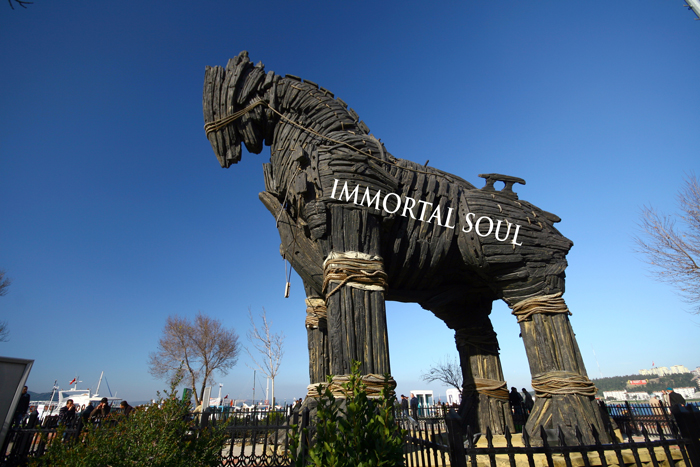
This false doctrine is a Trojan horse that entered the early church to bring Christianity in line with every other religion. It has continued to bear rotten fruit ever since. Without this false doctrine in place, the Catholic Church would not have been able to mislead the public on such a grand scale with its idolatrous worship of Mary, its prayers to the saints, and the threat of purgatory or even hell. Neither would the new age movement have been successful in enticing so many with its promises of reincarnation and finding the immortal “god within.” Buddhism, Hinduism, and Islam make similar promises. Indeed, the false claim that our souls live on after death is at the heart of every false religion. Unfortunately, the Christian church embraced the same claim from the fourth century AD onwards due to the introduction of unbiblical church creeds and pressure from authorities. This topic should differentiate Christianity from every other religion, but it does not.
Death is final. If Yahuwah had not resurrected Yahushua from the grave, he would still be dead today, completely dead, non-existent. Likewise, when we die, we also cease to exist. We cannot short-circuit the process of death somehow by going to heaven. Only Yahuwah can bring us back to life. So once dead, we wholly depend on the resurrection. The Bible describes death as “asleep in Christ” in verses such as 1 Corinthians 15:18: “Then those who have fallen asleep in Christ have perished.” For the Christian, sleep is an apt description of death because despite being dead in every sense of the word, we can have complete confidence that we will be brought back to life at the resurrection, just as we have the certainty of waking up from a natural sleep. Standard terms used to denote this view are the “sleep of the dead,” “soul sleep,” or “conditional immortality.” By nature, we are mortal. We become immortal only because Yahuwah awards immortality as a gift for His pleasure.
During the Reformation, men such as Luther and others initially leaned towards this view of the sleep of the dead. However, Calvin strongly disagreed and instead taught the doctrine of the intermediate state, which became more generally accepted and is still dominant in the traditional church today. This is the idea that although the body dies, the soul goes to heaven in a disembodied state. It neatly accommodates the proposal of simultaneously being dead in the earth's dust but alive in heaven. It is not logical in any sense, but let us consider some biblical passages used in its defense.
The Souls Under the Altar
The souls under the altar, as seen by John in Revelation 6:9, are often quoted in support of the intermediate state, the implication being that there is a scene before the resurrection where souls already exist in heaven. But it is simply a picture of Yahuwah declaring that He will not forget those martyred for His name’s sake, similar to the picture in Genesis 4:10, where Abel’s blood “cries out” for justice. Also, in Hebrews 12:24, Yahushua’s blood “speaks” better than Abel’s blood. Obviously, in neither of these pictures was blood crying out or speaking, so in this scene from Revelation, we should not conclude that these are “immortal souls.” Besides, souls without a body would presumably not be visible to John.
Further on in Revelation 6:11, John is told that these souls (i.e., persons) must sleep a little longer. We know that death is often referred to as sleep, so John is being told here that these martyrs will remain dead for now, despite Yahuwah’s clear intention to avenge their murderers. John sees a similar picture of the martyrs in Revelation 20:4, but this time, when the millennium is about to begin, John sees the souls (persons) come to life. This is significant. A soul cannot come to life if it is already alive.
Absent from the Body
Another famous passage used as evidence for the immediate state is found in 2 Corinthians 5. Verse 8 is often misquoted as “to be absent from the body is to be present with the Lord,” but this is an incorrect reading. Instead, the verse says that Paul “would prefer to be absent from the body and to be at home with the Lord,” which introduces a very different sense. Paul wishes to be absent from the body. Paul also wishes to be at home with the Lord. He does not deny a period of death in between. The clear scriptural witness is that the dead sleep and know nothing until the resurrection. Verses such as 1 Corinthians 15:53 testify to this. We read that “this perishable must put on the imperishable, and this mortal must put on immortality,” reminding us that it is only when we receive spiritual bodies that we inherit life and immortality.

In this passage from 2 Corinthians 5, Paul plainly describes three states. The first state is our earthy tent (or earthly body), as in verse 1. The second stage is our unclothed state (or death), as in verses three and 4a. The third is our clothed state (or resurrection state), as in verse 4b. Paul does not suggest that we receive a heavenly body directly after death. On the contrary, he alludes to the reality of death, or being unclothed, in verse 4a as something that none of us want but is inevitable for most. His point is that by dying to this world, he may be unclothed (or dead) and, therefore, one step closer to the sure resurrection promised by Yahuwah.
We know from Ecclesiastes 9:5, 10 that the dead know nothing. Therefore, although we do not wish to be dead, it is at least comforting to rest assured that we will know nothing of it until our next conscious thought at the resurrection.
The Thief on the Cross
Let us consider the thief (or criminal) on the cross in Luke 23:32-43 with parallel accounts in other gospels. The thief asks Yahushua to remember him when he comes into his Kingdom. The traditional reading is that Yahushua assures him they will both be in paradise that same day.
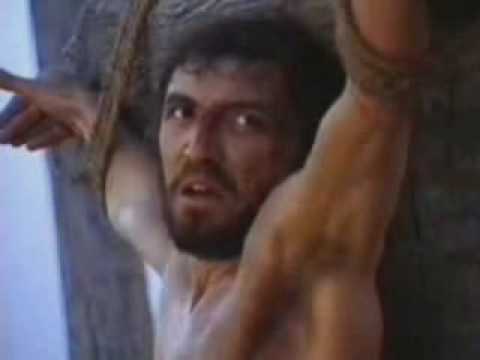 We should first stop and reflect on the nature and timing of Yahushua’s Kingdom. Yahushua never understood paradise as a realm of the dead but as a reference to the new world, his future Kingdom, which will be established on earth at the end of this age with Yahushua as King. In the gospels, Yahushua preached about the future Kingdom on Earth. He constantly stated the phrase in Mark 1:15: “The Kingdom of Yahuwah is at hand; repent and believe in the Gospel.” The Gospel (good news) of Yahushua is that a new Kingdom is coming. This new Kingdom is still not here today but will come one day. The Old Testament repeatedly refers to this future, earthy Kingdom as a place where all things will be renewed, as described so strikingly in books such as Isaiah, Ezekiel, Daniel, the Psalms, and elsewhere. Revelation 11:15 speaks of when this Kingdom will finally be awarded to the Lord Yahushua and the saints: “The kingdom of the world has become the Kingdom of our Lord and His Christ, and he will reign forever and ever” (see also Dan. 7:27).
We should first stop and reflect on the nature and timing of Yahushua’s Kingdom. Yahushua never understood paradise as a realm of the dead but as a reference to the new world, his future Kingdom, which will be established on earth at the end of this age with Yahushua as King. In the gospels, Yahushua preached about the future Kingdom on Earth. He constantly stated the phrase in Mark 1:15: “The Kingdom of Yahuwah is at hand; repent and believe in the Gospel.” The Gospel (good news) of Yahushua is that a new Kingdom is coming. This new Kingdom is still not here today but will come one day. The Old Testament repeatedly refers to this future, earthy Kingdom as a place where all things will be renewed, as described so strikingly in books such as Isaiah, Ezekiel, Daniel, the Psalms, and elsewhere. Revelation 11:15 speaks of when this Kingdom will finally be awarded to the Lord Yahushua and the saints: “The kingdom of the world has become the Kingdom of our Lord and His Christ, and he will reign forever and ever” (see also Dan. 7:27).
In the meantime, the world is still in the hands of Satan. The critical point here is that Yahushua did not come into his Kingdom on the day he died on the cross. First, he died entirely until he was brought back to life three days later at his resurrection. Secondly, Yahushua’s inheritance of the earthly Kingdom is a future event. Therefore, the traditional interpretation of this passage makes no sense. Yahushua knew he would be in a state of death that day, so he could not promise the thief that they would both be in paradise that same day. Something is amiss. The culprit is the placement of a comma that did not exist in the original Greek. The verse can ideally be equally read as “I tell you today [a common idiom of the time], you will be with me in paradise,” which, given what we know about the finality of death and the timing of Yahushua’s future Kingdom, is undoubtedly the intended meaning behind this often-misunderstood verse. See also Acts 20:26: “I tell you today...”
Enoch
Genesis 5:24 may suggest that Enoch was taken to heaven without dying when it states, "Yahuwah took him.” The verse is later referenced in Hebrews 11:5, which speaks of Enoch being brought up so he would not see death. It is possible that Enoch was taken away to a safe location out of harm, but the language is not clear. However, we know that Enoch died the usual death because Hebrews 11:13 reminds us that all the people listed, including Enoch, “died in faith.” Enoch died like everyone else.
Elijah
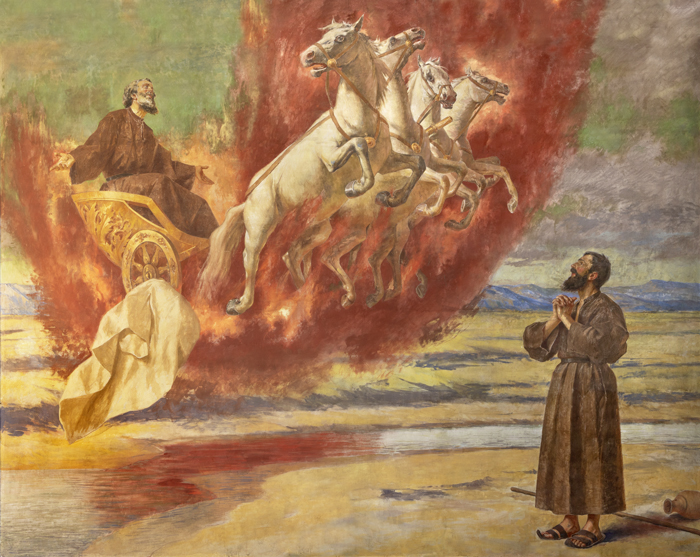
Many believe that Elijah was taken up to heaven in 2 Kings 2:11. The Hebrew word for heaven here (shamayim) can just as well be translated as “sky,” suggesting that Elijah may have been simply moved to a different location through the sky just as Philip was in Acts 8:39. Following Elijah’s ascension, Elisha speaks to King Jehoshaphat in 2 Kings 3:13, so we know that King Jehoshaphat was alive after Elijah’s ascension into the sky. Yet 2 Chronicles 21:12 states that Jehoshaphat’s son Jehoram received a letter from the prophet Elijah. This is conclusive evidence that Elijah lived beyond his ascension. He was not taken to heaven as is commonly believed. This is confirmed in John 3:13: “No one has ascended into heaven.”
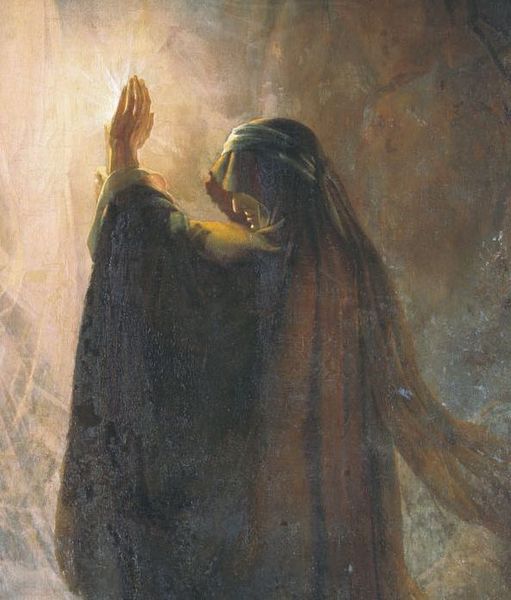 The Witch of Endor
The Witch of Endor
The story of the witch of Endor in 1 Samuel 28 describes Saul’s attempt to communicate with the dead through a medium (v. 7). Few Christians today believe a medium can summon the dead, so we should not conclude that Saul’s medium was capable of anything different. This was a case of demonic impersonation. Saul consulted a demon through the medium, who confirmed this by saying that she saw a divine (spiritual) being coming out of the earth in verse 13. The dead are dead and know nothing. Saul was deceived, as many are similarly deceived by mediums still today.
The Transfiguration
In Matthew 17, we read of Yahushua’s transfiguration, a scene of Yahushua in his resurrected, spiritual body talking with Moses and Elijah. This is a vision (Greek drama, Matt. 17:9) of a future event because Yahushua did not receive his spiritual body until after his resurrection. Moses and Elijah will remain dead until they receive their spiritual bodies when Yahushua returns. Yahushua is the firstborn from the dead (Col. 1:18). Nobody was resurrected to immortality before him, and nobody has been since. Yahuwah’s intention in this vision was to encourage and strengthen Yahushua by giving him a glimpse of his future inheritance as he approached the most atrocious stage of his earthly mission. Moses and Elijah, representatives of the law and the prophets, had undergone some of the hardships that Yahushua would soon undergo. Yahushua was reminded of what he had read about these two great men in the Scriptures. The transfiguration was a vision of Yahushua’s future Kingdom, a prophecy of his exalted state as clarified in 2 Peter 1:18- 19: “We heard this utterance made from heaven when we were with him on the holy mountain. And so we have the prophetic word made more sure.”
The Old Testament contains various references to the dead returning to the dust of the earth after death. In 1 Kings 2:10, we read that David went to sleep with his ancestors. Psalm 13:3 talks about sleeping the sleep of death, and Job 14:12 states that a dead person does not rise from the sleep of death before the resurrection. There are many other such passages. The concept of going to heaven at death was entirely foreign to the Hebrews, who firmly believed that they were destined to return to the dust of the earth just as Yahuwah said in Genesis 3:19. In Daniel 12:2, we read that one day the dead will be resurrected to everlasting life: “Many of those who sleep in the dust of the ground will awake, these to everlasting life, but the others to disgrace and everlasting contempt.”
This theme of the dead sleeping until the resurrection is continued throughout the New Testament as we read in verses such as 1 Thessalonians 4:16: “For the Lord himself will descend from heaven with a shout, with the voice of the archangel, and with the trumpet of Yahuwah; and the dead in Christ will rise first.” And Revelation 20:4: “I saw the souls of those who [those persons who] had been beheaded because of the testimony of Yahushua and because of the word of Yahuwah, and those who had not worshiped the beast or his image, and had not received the mark upon their forehead and upon their hand; and they came to life and began to reign with Christ for a thousand years.”
Either the dead are dead, or they are not dead. They cannot be both dead and alive in heaven. The truth is plain and straightforward once we step back from tradition and allow the Scriptures to speak for themselves. Yahuwah wants us to know what happens when we die. It should not be clouded in mystery. Our only hope is in the resurrection, which will occur when Yahushua returns. Claiming that we are somehow alive in heaven before the resurrection only devalues the incredible significance of the resurrection as our only great hope. If we die at death, then the resurrection is our only hope, which explains its constant emphasis and anticipation throughout the New Testament. Even for Yahushua, there was no shortcut to life after death. Yahushua’s only hope of life after death was the resurrection, and so it is for us.

This is a non-WLC article by Nigel Page-Jones, England.
We have taken out from the original article all pagan names and titles of the Father and Son, and have replaced them with the original given names. Furthermore, we have restored in the Scriptures quoted the names of the Father and Son, as they were originally written by the inspired authors of the Bible. -WLC Team







